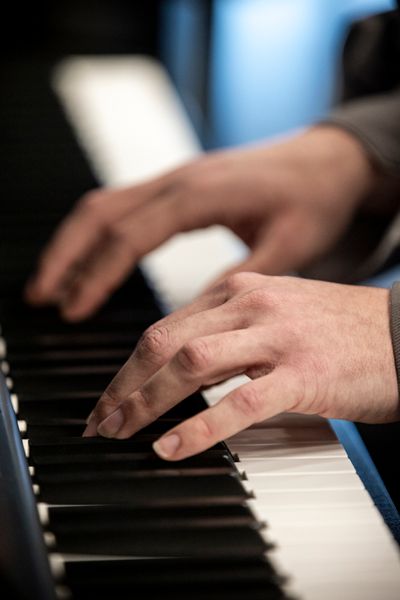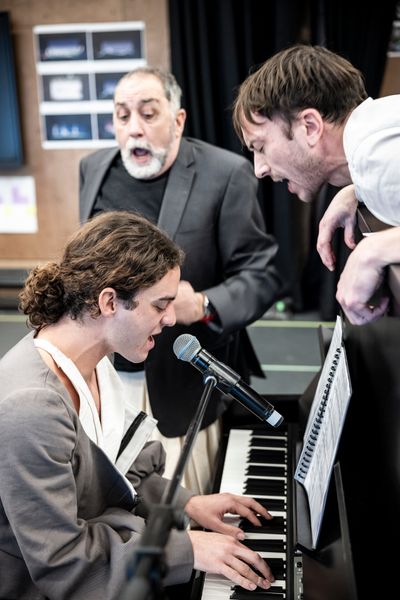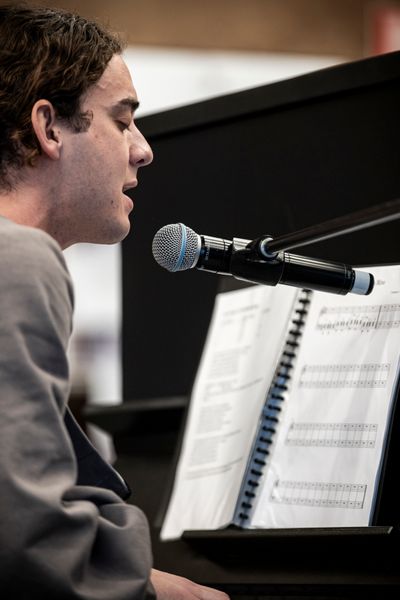




William Shakespeare is more than just a poet and playwright – he’s also the inspiration for musicians from every modern genre you can shake a (drum) stick at.
By Andy McLean
We’re buzzing with anticipation at Bell Shakespeare because Australian songwriter Sarah Blasko is crafting music for our 2023 production of Twelfth Night. In performing music inspired by Shakespeare, Sarah follows in the giant footsteps* of the biggest stars in rock, folk, jazz, metal, pop, and hip hop.
Twelfth Night begins with Duke Orsino celebrating the power of music (“If music be the food of love, play on”), and so our exploration of Shakespeare in popular music also begins with a Duke.
Duke Ellington to be exact. Back in the 1950s, the jazz legend gathered his orchestra to record Such Sweet Thunder, an entire album based on Shakespeare’s plays. From the eerie ‘Sonnet for Caesar’ to the breezy swing of ‘Madness in Great Ones’, the suite of 12 tunes offers an imaginative twist on the Bard’s back catalogue. It’s essential listening for theatre nuts and jazz aficionados alike.
Having paused to doff our trilby hats to the late, great Duke Ellington, let’s launch headlong down the Rock N Roll Hall of Fame…
As the saying goes, anyone who remembers the 1960s wasn’t really there. So, we’ll forgive Paul McCartney for being a little hazy about what spurred him to create some of the most famous hits of that decade. What he strongly suspects though, is that his school Shakespeare studies influenced his song writing.
McCartney recently admitted that a line from Hamlet could have been the subconscious inspiration for ‘Let It Be’ (“But let it be Horatio, I am dead.”). And McCartney has also acknowledged that the last lines on the last album The Beatles made (‘The End’ on Abbey Road) sound like a Shakespearean rhyming couplet (“And in the end the love you take, is equal to the love you make”).
Not to be outdone, John Lennon stirred a drop of Shakespeare into The Beatles’ ‘I Am The Walrus’. Listen carefully to the psychedelic crescendo near the end of the song and you’ll hear fragments of a BBC radio performance of King Lear.
Then there’s the undisputed bard of the 1960s, Bob Dylan, who sprinkled not one but two Shakespeare characters into his sprawling ‘Desolation Row’ (an epic which clocks in at more than 11 minutes). Romeo blunders into the song first (staking his claim for Cinderella’s heart, before “someone says, ‘You’re in the wrong place my friend, you’d better leave.’”). Then later in the same song, Dylan goes on a hallucinatory ramble about the fate of Ophelia from Hamlet (“For her I feel so afraid”).
A decade on, Dylan’s one-time collaborators, The Band, were also stirred by Ophelia’s plight. In their country groove number ‘Ophelia’, drummer Levon Helm stepped up to the mic to ask: “Why do the best things always disappear, like Ophelia?”
Other rock luminaries to borrow from Shakespeare include prog maestros Rush (who quoted from As You Like It on the riff-laden ‘Limelight’ in 1981) and Led Zeppelin (rehashing a line from The Merchant of Venice on ‘Stairway to Heaven’ in 1971). And no run down of Shakespeare in classic rock would be complete without a nod to yet another duke – the Thin White Duke aka David Bowie. When performing his song ‘Cracked Actor’, Bowie often channelled his inner Hamlet by serenading a skull on stage.
Artistic Director Peter Evans also recalls including Bowie’s music in one of his early Bell Shakespeare productions, as well as The Rolling Stones and Violent Femmes. And in 2018, Peter wove Nick Cave’s ‘Fifteen Feet of Pure White Snow’ into the finale of Antony And Cleopatra.
If any writer understood the power of a killer line, it was surely Shakespeare. So, it’s no wonder that modern musicians have sliced, diced, and spliced his words to build entire songs around them.
A famous line from Henry IV Part II (“Uneasy is the head that wears a crown”) has recently struck a chord with rap royalty and rock royalty alike. In 2019, UK grime artist Stormzy constructed his hit single ‘Crown’ around the chorus line “Heavy is the head that wears the crown”. And this year, Oasis songwriter Noel Gallagher blended that line with another from Richard II on ‘Easy Now’, the lead single from his new solo album (“Heavy is the head that wears a hollow crown”).
Meanwhile, a single line from Macbeth (“Something wicked this way comes”) was borrowed by hip hop legend Tupac Shakur (‘Something Wicked’ in 1991), goth punks Siouxsie And The Banshees (‘Something Wicked (This Way Comes)’ in 1988) and Americana queen Lucinda Williams (‘Something Wicked This Way Comes’ in 2014). And, during The Cure’s current tour, Robert Smith is singing a variation of the same line on a new song (‘I Can Never Say Goodbye’, slated for release on the band’s next, long-delayed album).
The Scottish Play also crept its way into music by The Velvet Underground’s John Cale (‘Macbeth’ in 1971) and Elvis Costello (‘Miss Macbeth’ in 1989) plus an instrumental side project by art rockers Sonic Youth (‘Macbeth’ in 1989). And Billy Bragg rewrote a chilling line from Lady Macbeth and made it warm and fuzzy (‘Milkman Of Human Kindness’ in 1983), before Aussie psych pioneers The Lovetones smoothed out the rough edges in their cover version (on 2020 album ‘Myriad’).
Check out some Shakespeare inspired tunes as you read on.
Brimming with romance and rhyme, Shakespeare’s sonnets would seem an obvious source of lyrics for modern day musicians. But surprisingly few have tried it.
In 1987, Sting borrowed a line from Sonnet 130 for his song ‘Sister Moon’ (“My mistress’ eyes are nothing like the sun”) and Richard Ashcroft gets a point for trying with this dodgy rhyming couplet: “Yeah, there’s love if you wannit/ Don’t sound like no sonnet” (on The Verve’s 1997 single ‘Sonnet’).
But the top prize for sonneteering goes to Australian troubadour Paul Kelly, who released an entire album of Shakespeare’s sonnets set to music in 2016. While the whole record deserves a listen, the highlight is arguably ‘Sonnet 138’ – a lush, lounge room jazz ballad.
(An honourable mention should also go to New York author Erik Didriksen, who reversed the process in 2015. He rewrote modern pop hits and turned them into sonnets in his book Pop Sonnets: Shakespearean Spins on your Favourite Songs.)
On ‘Weather With You’, Crowded House pointed out that “Julius Caesar and the Roman Empire couldn’t conquer the blue sky”. That may be true, but Shakespeare’s Caesar has conquered multiple genres of popular music.
Elton John sang about the character on his 1970 piano lament ‘The King Must Die’. Then heavy metal gods Iron Maiden referenced the play in the title of their 1981 song ‘The Ides of March’, before blasting out a line from the play in the chorus of ‘The Evil That Men Do’ in 1988. Seminal indie folkster Conor Oberst also used a line from the play to reflect on cancel culture on ‘You All Loved Him Once’ in 2017.
In fact, Oberst is just one of many indie virtuosos to dabble with Shakespeare. In 1994, on the lilting classic ‘Lover, You Should Have Come Over’, Jeff Buckley rewrote a line from Richard III (“My kingdom for a kiss upon her shoulder”). In 2009, the title song from Mumford & Sons’ debut album (‘Sigh No More’) quoted liberally from Much Ado About Nothing. And in 2021, the aforementioned Nick Cave lent his inimitable voice to a digital retelling of A Midsummer Night’s Dream for the Royal Shakespeare Company.
And last year, Pulp front man Jarvis Cocker revealed that the first song he ever wrote was named ‘Shakespeare Rock’ (including the lyrics: “Got a baby, only thing’s wrong. Quotes Shakespeare all day long. Said baby, why you ignoring me? To be or not to be.”)
Then there is Morrissey, who has a somewhat complicated relationship with Shakespeare. Moz used a variation of a line from Much Ado About Nothing at the start of The Smiths’ classic ‘You’ve Got Everything Now’ in 1984 (“As merry as the days were long, I am right and you are wrong”). A year later, The Smiths single ‘Shakespeare’s Sister’ had more to do with a Virginia Woolf essay (A Room of One’s Own) than with Shakespeare’s actual sister (but it did give Bananarama escapee Siobhan Fahey the band name idea for Shakespeare’s Sister, the chart-topping group she formed with Marcella Detroit.)
In 1986, on The Smiths’ ‘Cemetry Gates’, Morrissey deliberately misquoted from Richard III (“You say: ‘ere thrice the sun done salutation to the dawn’”) then, in 1991, he punned on the title of King Lear, naming a solo song ‘King Leer’. (Sharp-eared readers may also recall Morrissey referring to Antony And Cleopatra on The Smiths’ ‘Some Girls Are Bigger Than Others’, which was a reference to a Carry On movie spoof of Shakespeare’s Roman plays.)



What about the gazillion songs inspired by Romeo And Juliet? Fear not. We haven’t overlooked Taylor Swift, Dire Straits, and all the rest. You can read about all these in our separate article about all the places where Romeo And Juliet crops up in popular culture.
PS:
*Technically, Sarah Blasko is following in her very own footsteps too. She composed the music, and performed, in Bell Shakespeare’s 2008 production of Hamlet. Listen to her recollections in this Speak The Speech podcast interview with Bell Shakespeare’s James Evans.
What have we missed?
What’s your favourite Shakespeare reference in pop music? What’s the weirdest you’ve heard? Jump on social media and tell us via Twitter, Facebook, Instagram and LinkedIn.
Tickets selling fast
Bell Shakespeare’s new production of Twelfth Night, featuring the music of Sarah Blasko, is arriving at Canberra Theatre Centre from 13 October and Sydney Opera House from 24 October.